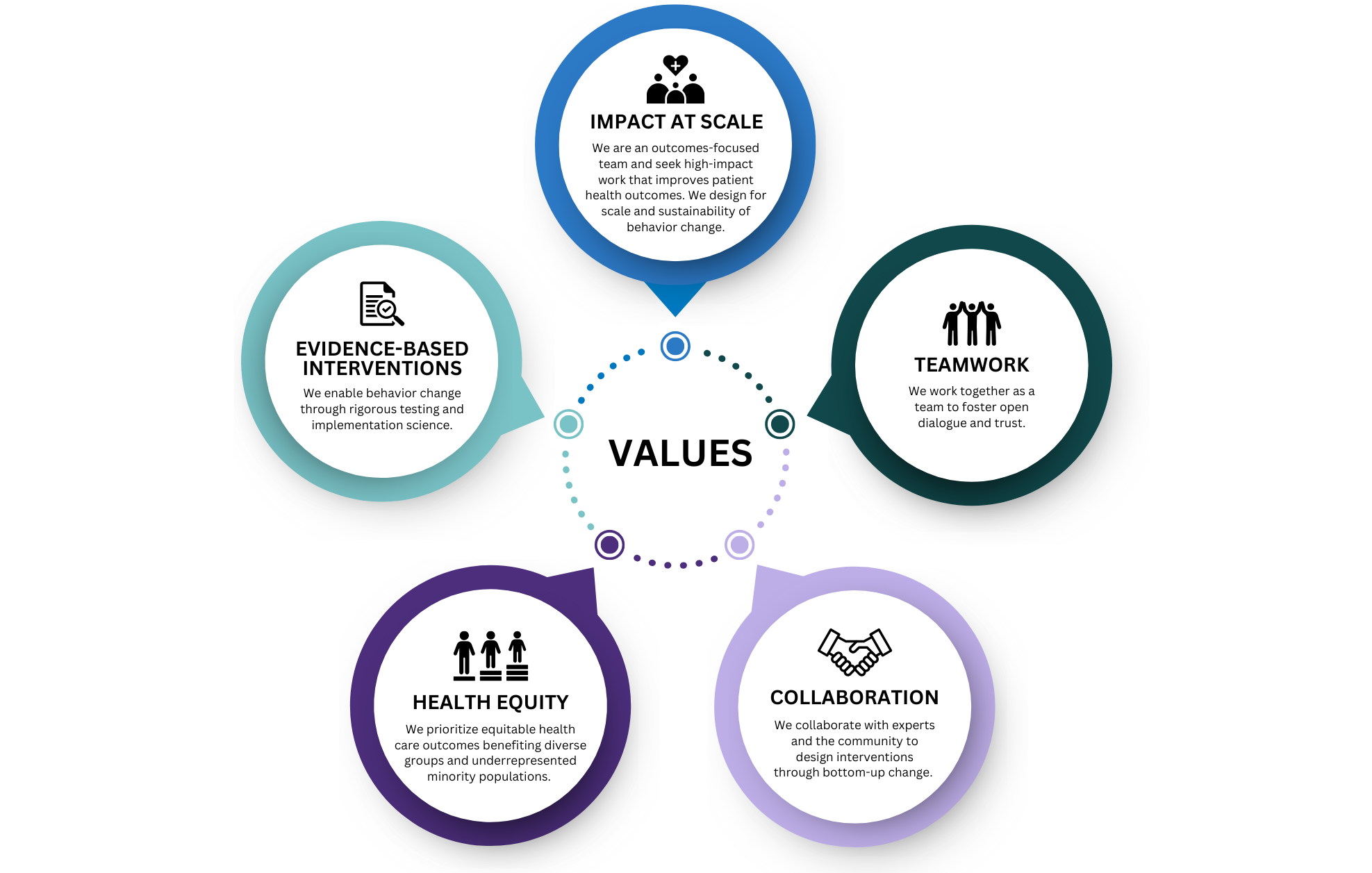Nudge Unit (original) (raw)

The Nudge Unit designs and implements scalable nudges to improve medical decision-making and patient outcomes
Overview
We work toward a future where the right choice is the easy choice for health.
Our mission is to design, implement, evaluate, and scale evidence-based, behaviorally informed nudges that steer decisions toward higher-value care, better patient outcomes, enhanced public health, and greater health equity.

History of the Nudge Unit

The Penn Medicine Nudge Unit was launched in 2016. The team began with two people and, within three years, grew to more than 20. From 2016 to 2021, the Penn Medicine Nudge Unit worked on more than 100 projects, including more than 25 randomized trials resulting in over 75 publications in leading medical journals such as NEJM, JAMA, Nature, and PNAS.
In 2018, the team launched an inaugural Nudges in Health Care Symposium to bring together health systems interested in using nudges or developing nudge units to improve health care. The first two symposia were hosted on Penn's campus and brought together leaders from 30 health systems. In 2021, the symposium took place virtually, and we broadened the audience to include health plans and other organizations working on using nudges to improve health care. The symposium resumed as an in-person gathering in 2023, convening more than 200 people from 50 institutions for an event themed around building behaviorally informed organizations.
Former directors of the Nudge Unit include founding director Mitesh Patel, MD, MBA, and Rinad Beidas, PhD. Kit Delgado, MD, MS, was named director of the Penn Medicine Nudge Unit in September 2022.
Kit brought with him to the role a wealth of experience, a seasoned team of researchers, and an exciting portfolio of work from the Behavioral Science & Analytics for Injury Reduction (BeSAFIR) lab, which he founded in 2017. Integrating the BeSAFIR research into the Nudge Unit portfolio has enabled the team to drive meaningful impact not only among clinicians and patients but also in public health.
Why Nudge?
Human behavior is the final common pathway for most advances in medicine. No matter how effective a medication, protective a vaccine, or beneficial a lifestyle modification is, they can only improve health if clinicians recommend them and patients utilize them.
This is where nudges come in. A nudge is a change in the way information is presented, or choices are framed that is designed to prompt, guide, or motivate good decision-making. A well-designed nudge will make the “right” choice the easy choice without restricting choice.
Project Phases
Projects at the Nudge Unit move through five phases.
Contextual inquiry and data analysis

Contextual inquiry and data analysis
We gather insights through stakeholder interviews and shadowing to understand inefficiencies and gaps in processes. Additionally, we leverage large data sets to gain valuable insights about the problems we aim to solve.
Design

Design
We collaborate closely with care teams, health system leadership, and patients to co-design nudges that address identified challenges, ensuring interventions are practical and effective.
Implementation

Implementation
We implement interventions in a pragmatic, measurable way, ensuring they can inform broader applications and larger-scale implementation across the health system.
Evaluation

Evaluation
We conduct thorough evaluations to assess both the intended and unintended effects of interventions, ensuring they achieve the desired outcomes and maintain effectiveness.
Scale and dissemination

Scale and dissemination
When successful, we scale solutions with health system leaders and share findings through publications, social media, and events to support wider adoption.
Key Project Domains
The design of practice environments heavily influences medical decision-making. We design and implement nudges that improve workflow and steer decision-making toward evidence-based care.
Daily health behaviors significantly impact long-term patient outcomes. We design and implement nudges that lead to significant and sustained change in patient engagement and behavior.
We design and implement interventions to reduce the public health burden of injury caused by epidemics such as distracted or impaired driving, opioid addiction, and gun violence.
Foundational Publications
Participate
We host an annual symposium to share insights and lessons learned from implementing nudges in health care and build collaborations across health systems. The 2024 Nudges in Health Care Symposium was held in Philadelphia on September 26–27.
Advance learning health system (LHS) science
The Penn PORTAL (Patient-Oriented Research and Training to Accelerate Learning) program is designed to advance progress toward an integrated LHS at Penn and in the wider Philadelphia region. Career development funding is available through two tracks: LHS Scientist Investigators and LHS Clinician Leaders.

 Kim Waddell, PhD, MSCI, OTR/L Research and Innovation Manager, Nudge Unit Kim Waddell, PhD, MSCI, OTR/L Research and Innovation Manager, Nudge Unit Kim Waddell is a research and innovation manager at the Nudge Unit, an assistant professor in the Department of Physical Medicine and Rehabilitation at the Perelman School of Medicine, and a core… Read more
Kim Waddell, PhD, MSCI, OTR/L Research and Innovation Manager, Nudge Unit Kim Waddell, PhD, MSCI, OTR/L Research and Innovation Manager, Nudge Unit Kim Waddell is a research and innovation manager at the Nudge Unit, an assistant professor in the Department of Physical Medicine and Rehabilitation at the Perelman School of Medicine, and a core… Read more